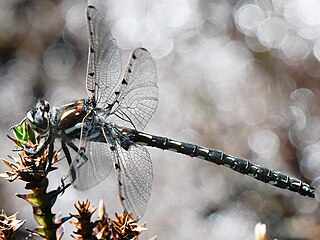
Odonata is an order of predatory flying insects that includes the dragonflies and damselflies. The two major groups are distinguished with dragonflies (Anisoptera) usually being bulkier with large compound eyes together and wings spread up or out at rest, while damselflies are usually more slender with eyes placed apart and wings folded together along body at rest. Adult odonates can land and perch, but rarely walk.

The insect family Macromiidae contains the dragonfly species known as cruisers or skimmers. They tend to fly over bodies of water straight down the middle. They are similar to Aeshnidae in size, but the eyes are green and just barely meet at the top of the head.

Somatochlora, or the striped emeralds, is a genus of dragonflies in the family Corduliidae with 42 described species found across the Northern Hemisphere.

The Platycnemididae are a family of damselflies. They are known commonly as white-legged damselflies. There are over 400 species native to the Old World. The family is divided into several subfamilies.

Austropetaliidae is a small family of dragonflies occurring in Chile, Argentina and Australia. Members of Austropetaliidae can be medium-sized to large dragonflies.

Lestes is a genus of damselfly in the family Lestidae. The family hold their wings at about 45 degrees to the body when resting. This distinguishes them from most other species of damselflies which hold the wings along, and parallel to, the body when at rest.

Trithemis kirbyi, also known as the Kirby's dropwing,orange-winged dropwing, or scarlet rock glider is a species of dragonfly in the family Libellulidae.
The Megapodagrionidae are a family of damselflies, commonly called flatwings for their habit of spreading out the hind wings horizontally when at rest.

Euphaeidae, sometimes incorrectly named Epallagidae and commonly called gossamerwings, is a family of damselflies in the odonate superfamily Calopterygoidea. The family is small, consisting of around 78 species living species in nine genera occurring in the Palearctic, Australasia, and Asia. The family contains two subfamilies, Euphaeinae, encompassing all the living species and a single fossil genus, and the extinct Eodichromatinae, encompassing fossil genera from the Eocene to late Oligocene. Euphaeid species are large and mostly metallic-coloured, looking similar to species of damselflies in the family Calopterygidae.

Platystictidae is a family of damselflies, commonly known as shadowdamsels. They look very similar to the threadtail damselfly family (Protoneuridae). They can mostly be found throughout Asia, Central America, and South America.

The Synthemistidae are the family of dragonflies commonly known as tigertails, or sometimes called southern emeralds. This family is part of the superfamily Libelluloidea.

Coenagrionoidea is a superfamily of closed wing damselflies of the order Odonata found worldwide.

Chalcolestes viridis, formerly Lestes viridis, is a damselfly of the family Lestidae. It has a metallic green body and at rest it holds its wings away from its body. Its common name is the willow emerald damselfly, the green emerald damselfly, or the western willow spreadwing. It has an elongated abdomen and pale brown spots on its wings and resides in areas of still water with overhanging trees.

The brilliant emerald, Somatochlora metallica, is a middle-sized species of dragonfly. It is the largest and greenest of the Somatochlora species; 50–55 millimetres (2.0–2.2 in) long.

Epiophlebia is a genus of damsel-dragonfly native to the Indian subcontinent, East Asia, and Southeast Asia. It is the only living genus of Odonata to neither be a dragonfly nor a damselfly. It is the sole member of the family Epiophlebiidae, which is itself the sole living representative of the infraorder Epiophlebioptera.

Aeshnoidea is a superfamily of dragonflies that contains two extant families, Aeshnidae and Austropetaliidae.

Libelluloidea is a superfamily of dragonflies.
Telephlebiidae was once regarded as a separate family of dragonflies that were endemic to eastern and south-western Australia. However, recent taxonomic revisions have resulted in the classification of species that were previously placed in Telephlebiidae to now be part of the family Aeshnidae.

Calopterygoidea is a superfamily of damselflies in the order Odonata.
















